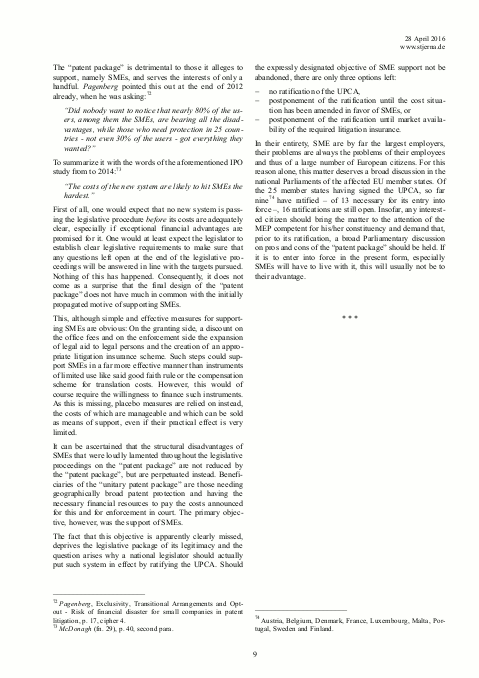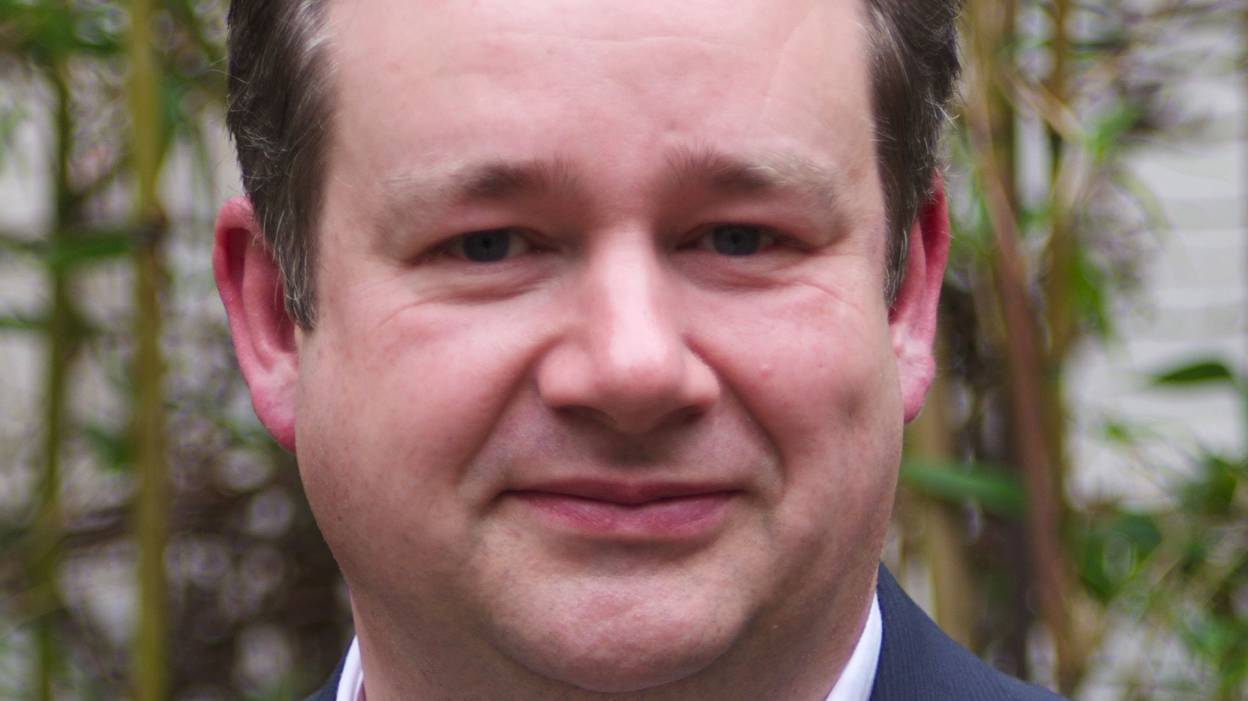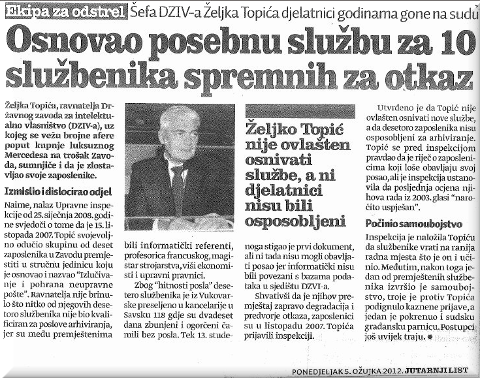05.03.16
Posted in Europe, Patents at 5:19 am by Dr. Roy Schestowitz
Dr. Ingve Björn Stjerna’s latest paper

Summary: A detailed academic analysis of the Unitary (or Unified) Patent Court reveals/concludes/asserts that it is being marketed or promoted using a misleading premise and promise
“Unitary patent” and court system – A poisoned gift for SMEs is the title of a new paper from Dr. Ingve Björn Stjerna, whom we mentioned here before because he closely studied the UPC for a long time (even before it was known as “UPC”). Based on the paper’s PDF (permission granted for us to host a copy), there is a big gap between truth/reality and promotional claims (advertising). The SMEs are often being exploited by proponents of the UPC, who sort of ‘hijack’ the voice and SMEs and claim to speak on their behalf when they say that the UPC would better serve SMEs, not large corporations that often come from outside Europe.
 As the paper states in relation to Europe, “SME are by far the largest employers, their problems are always the problems of their employees and thus of a large number of European citizens. For this reason alone, this matter deserves a broad discussion in the national Parliaments of the affected EU member states. Of the 25 member states having signed the UPCA, so far nine have ratified – of 13 necessary for its entry into force –, 16 ratifications are still open. Insofar, any interested citizen should bring the matter to the attention of the MEP competent for his/her constituency and demand that, prior to its ratification, a broad Parliamentary discussion on pros and cons of the “patent package” should be held. If it is to enter into force in the present form, especially SMEs will have to live with it, this will usually not be to their advantage.”
As the paper states in relation to Europe, “SME are by far the largest employers, their problems are always the problems of their employees and thus of a large number of European citizens. For this reason alone, this matter deserves a broad discussion in the national Parliaments of the affected EU member states. Of the 25 member states having signed the UPCA, so far nine have ratified – of 13 necessary for its entry into force –, 16 ratifications are still open. Insofar, any interested citizen should bring the matter to the attention of the MEP competent for his/her constituency and demand that, prior to its ratification, a broad Parliamentary discussion on pros and cons of the “patent package” should be held. If it is to enter into force in the present form, especially SMEs will have to live with it, this will usually not be to their advantage.”
We already wrote several posts here on why the UPC has nothing to offer to European SMEs and should thus be rejected. There are no pros that we can see, only cons. It’s a con. When patent lawyers and their media assert that UPC would serve SMEs one needs to stop and wonder what kind of clients they have (maybe potential patent trolls or their victims).
To quote the abstract of the paper:
On 16 February 2016, the German Ministry of Justice and Consumer Protection presented two pieces of draft legislation for the ratification of the international Agreement on the Unified Patent Court. After the fees for the “unitary patent” have been fixed and a proposal for the court fees and the limits of reimbursable representation costs at the Unified Patent Court has been provided, the political promise that the new system would support small and medium-sized enterprises (SMEs) can be judged against the realities. It does not come as a surprise that it is not being fulfilled. Most recently, even the European Commission declared that cost risk would be so significant that SMEs required an insurance to cover it, while admitting at the same time that currently no such insurance is available. An overview on desire and reality as to the costs of the “unitary patent” and the Unified Patent Court.
In the face of EPO lobbying for the UPC (even a month ago in the UK) it is important for European citizens to speak out and to help stop the UPC, which is an unprecedented injustice much like TTIP and TPP. It’s not at all for the interests of European; au contraire. █
Permalink
 Send this to a friend
Send this to a friend
Posted in Europe, Patents at 4:57 am by Dr. Roy Schestowitz
English/Original
Article as ODF
Publicado en Europe, Patents at 1:15 pm por el Dr. Roy Schestowitz

Sumario: Todavía hay trabajo político que está siendo hecho — aunque discretamente — contra Battistelli y sus chácales en la alta gerencia de la Oficina Europea de Patentes
A veces tenemos la impresión de derrotismo dentro de los empleados de la EPO. Algunos encontrarían difícil de creer que Battistelli renuciará y que los empleados despedidos retornen a sus puestos de trabajo, aunque trabajo todavía esta siendo hecho (usualmente más discreto que antes) para ese fin.
“Acerca de la situación de la EPO,” una persona nos informó acerca de un insider, “ella/el no espera que cambie mucho para mejoría, dado la reticencia del Consejo Administrativo para hacer otra cosa, que apoyar al presidente. Ella/el parece estar muy frustado/a por la falta de acción de los gobiernos nacionales, incluyendo nuestro ministro de (in)justicia en Alemania, quien es en mi opinión un chiste triste.”
“Los Países Bajos están cada vez más preocupados así como Francia.”
Alemania, por las razones que he explicado aquí varias veces antes, está cómodo haciendose de la vista gorda porque se beneficia económicamente de la EPO. Pero eso no significa que otros países también elijan la inacción. Los Países Bajos son cada vez más preocupados así como Francia. La dirección predominantemente francesa alrededor de Battistelli (sus amigos y sus familiares) se están convirtiendo en una vergüenza nacional que promueve la percepción de corrupción sistémica.
“El diputado Francés Philip Cordery,” escribió a la SUEPO el día de hoy “, informó en un blog fecha 25 de abril el año 2016 sobre una carta conjunta (escrito con otros parlamentarios franceses: Pierre-Yves Le Borgn ‘, Richard Yung, Claudine Lepage, Jean-Yves Leconte y Hélène Conway-Mouret), de 21 de abril de 2016, a la ministra francesa de Economía Emmanuel Macron. La carta fue enviada “con el fin de exigir una vez más que Francia tome medidas hacia una reforma de la gestión de esta organización internacional” “.
El PDF link/original en Francés [PDF] sugiere trabajo contínuo ‘detrás de las escenas’, para decir así, no por primera vez por el Sr. Cordery [1, 2, 3, 4, 5, 6, 7]. Cordery de todas maneras sabe que Battistelli se ha convertido en fuente de gran vergüenza al pueblo Francés.
Una traducción del blog post[PDF] (original) y unatraducción de la carta[PDF]fue publicada en Ingles y publicada por la SUEPO y aquí va:
EPO: Mantengan la presión para reformar la gerencia
Después de la última reunión del Consejo de Administración de la Oficina Europea de Patentes, que, junto con un número de mis colegas que representan a los ciudadanos franceses establecidos fuera de Francia, pidió a la ministra de Economía, Emmanuel Macron, con el fin de exigir una vez más a Francia que adoptara acción hacia una reforma de la gestión de esta organización internacional.
Y la carta acompañante:
París, 21 de Abril el año 2016
Ref .: PC / AF / 169
Ministro,
Deseamos llamar su atención sobre la importancia de las decisiones adoptadas en la última reunión del Consejo de Administración de la Oficina Europea de Patentes.
Nos complace observar que la resolución fue votada a través, como resultado de un compromiso con el fin de obtener una mayoría. Por ello, ha sido posible centrarse en el conflicto social y la imposición de sanciones y procedimientos disciplinarios contra miembros del personal de EPO. Damos la bienvenida a la función desempeñada por Francia, que, por su mediación, ha aceptado sus responsabilidades y movilizado a sus socios con respecto a estas cuestiones.
Ahora estamos llamando a la mayor vigilancia de su parte con respecto a la aplicación efectiva de las medidas derivadas de la presente resolución. En nuestra opinión, es esencial que las personas interesadas se les da la oportunidad de hacer recurrir rápidamente a una autoridad externa para volver a examinar los problemas y actuar en el arbitraje con respecto a las sanciones que han sido impuestas sobre ellos, y que esto se ponen en vigor sin más demora.
La presente inmunidad de la gestión de la EPO con respecto a la gestión del personal y la elección de las actitudes estratégicas adoptadas por la Oficina es un asunto de gran preocupación. Se suscita preocupación en relación con el futuro de esta organización, y el desarrollo de la innovación en Europa. La nacionalidad y el estado como un ejecutivo francés del Presidente imponen una responsabilidad particular en nuestro país en la situación actual. Es por esta razón que, en nuestra opinión, es imperativo que Francia, a través de su representante oficial en el Consejo de Administración, actúa de tal manera que un cambio importante en la gestión de la Oficina pueda entrar en vigor rápidamente.
En la actualidad, los dos representantes del Sindicato que fueron despedidos en Munich no han sido reintegrados, y los abusos degradantes de los estatutos de la Oficina de continuar. Algunos
miembros del personal de la Haya están todavía bajo investigación. Uno de ellos en particular, ha sido privado de cualquier tratamiento como consecuencia de la falta de consideración de su trabajo parar debido a una enfermedad, dando lugar al temor de un posible despido. Por tanto, creemos que es esencial que nuestros propios ciudadanos, que son víctimas por igual con los otros miembros del personal de la política de gestión represiva adoptada por el Presidente de la Oficina, serán totalmente compatibles y continuamente durante esta prueba.
Estamos a su disposición para discutir estos asuntos con usted. Más que nunca, estamos convencidos de que una importante reforma de la gestión de la EPO es esencial, y que están deseosos de que nuestra
país debería comprometerse con este fin, sin ningún tipo de limitaciones.
Seguimos siendo, ministro, Atentamente
Philip Cordery
Pierre-Yves Le Borgn’
Richard Yung
Claudine Lepage
Jean-Yves Leconte
Hélène Conway-Mouret
Emmanuel MACRON
Minister of the Economy, Industry, and the Digital Sector
139, rue de Bercy
75572 Paris Cedex 12
Copy to Yves LAPIERRE
Director General
National Institute of Industrial Property
Assemblée Nationale – 126 rue de l’Université 75007 PARIS
pcordery@assemblee-nationale.fr – 01 40 63 06 58
Hay acción adiciónal de los estados miembros de la EU contra la EPO, pero detalles relevantes a ello podrían comprometer las acciones potencialmente. La saga de la EPO no se ha acabado, a pesar de la calma relativa. No se dejen engañar. Battistelli fue aconsejado a mantener un bajo perfil por alguna razón. Es una masiva operación de lavado de reputación.
Permalink
 Send this to a friend
Send this to a friend
05.02.16
Posted in America, Courtroom, Patents at 1:45 pm by Dr. Roy Schestowitz
Another ‘Alice’ on the way?

The bronze doors of the US Supreme Court
Summary: A quick review of some of the latest developments regarding SCOTUS (the US Supreme Court) as far as patents go
There will soon be an interesting design patent case at the Supreme Court of the United States, alongside other cases that are not about patents and some that are (some are about copyrights too). A new article by Dennis Crouch, covering a “patent-copyright parallel” (not exactly the same as in Oracle v. Google), says about one such case: “In both patent and copyright cases the issue of laches arises more often than you might think because of the legal treatment of “ongoing” infringement. Each infringing act is seen as a new act of infringement. Thus, the six-year limits period starts anew each time a new copy of the infringing product is made, sold, or used. If someone has been making an infringing product for the past 10 years, the statute would let the patentee them reach back 6 years for damages. Courts often see that result as as problematic when the patentee sits on its rights for so long (and since most civil claims have a shorter period of limitations) and thus apply the laches doctrine to limit collection of back damages even when within the six-year period.”
“Müller essentially changed sides and he is against Apple’s unreasonable patent demands these days.”“This is, incidentally,” said this one person, “the second time this term that SCOTUS has granted one copyright and one patent case in a day” (SCOTUS typically rules in favour of reformists these days, so whichever such case the Justices take under their wing would likely end well).
As Florian Müller put it in this morning’s article about design patents: “In about five weeks from now, we’ll see how successful Samsung’s mobilization efforts have been, and two months after that we’ll see the fruits of Apple’s campaigning.” The focus of Müller, however, is stated upfront in his title: “Where will the ‘friends of the Supreme Court’ come down on design patent damages in Apple v. Samsung?” Müller and I do not agree on the Oracle v. Google case (we had a long exchange about it today), but we do agree on the Samsung case. Müller essentially changed sides and he is against Apple’s unreasonable patent demands these days. If SCOTUS rules against Apple (in any of the ongoing cases), it will be good news for Google, for Android, for Free software, and for Linux. Apple has placed itself on the wrong side of history. █
Permalink
 Send this to a friend
Send this to a friend
Posted in Europe, Patents at 1:15 pm by Dr. Roy Schestowitz

Summary: There is still political work being done — albeit rather discreetly — against Battistelli and his goons at the European Patent Office’s top-level management
WE sometimes get the impression of defeatism among EPO staff. Some find it hard to believe that Battistelli will step down and dismissed staff representatives reintegrated into the workforce, even though work is still being done (usually more discreetly than before) towards that.
“As for the EPO situation,” one person told us about an insider, “s/he doesn’t expect much to change for the better, given the Administrative Council’s unwillingness to do anything other than, more or less, backing the president. S/He, too, appears to be very frustrated with the lack of action on the part of national governments, including our minister of (in)justice in Germany, who’s a sad joke in my opinion.”
“The Netherlands is increasingly concerned and so is France.”Germany, for reasons we have explained here several times before, feels comfortable turning a blind eye because it benefits financially from the EPO. But that doesn’t mean other countries too choose inaction. The Netherlands is increasingly concerned and so is France. The predominantly French management around Battistelli (his cronies and their family members) are becoming a national embarrassment that promotes perception of systemic corruption.
“The French MP Philip Cordery,” SUEPO wrote earlier today, “reported in a blog post dated 25 April 2016 about a joint letter (written with other French MPs: Pierre-Yves Le Borgn’, Richard Yung, Claudine Lepage, Jean-Yves Leconte and Hélène Conway-Mouret), dated 21 April 2016, to the French Minister of Economic Affairs Emmanuel Macron. The letter was sent “in order to demand once again that France take action towards a reform of the management of this international organization”.”
The PDF link/original in French [PDF] suggests ongoing work ‘behind the scenes’, so to speak, not for the first time from Mr. Cordery [1, 2, 3, 4, 5, 6, 7]. Cordery et al ought to know that Battistelli has become a source of great shame to France.
A translation of the blog post [PDF] (original) and a translation of the letter [PDF] in English was posted by SUEPO and here it is in English:
EPO: Keep up the pressure for management reform
Following the last meeting of the Administrative Council of the European Patent Office, I, together with a number of my colleagues representing French citizens established outside France, called upon the Minister of the Economy, Emmanuel Macron, in order to demand once again that France take action towards a reform of the management of this international organization.
And the accompanying letter:
Paris, 21 April 2016
Ref.: PC/AF/169
Minister,
We wish to draw your attention to the importance of the decisions taken at the last meeting of the Administrative Council of the European Patent Office.
We are pleased to note that a resolution was voted through, resulting from a compromise in order to obtain a majority. It has therefore been possible to focus on the social conflict and the imposition of sanctions and disciplinary procedures against EPO staff members. We welcome the role played by France, which, by your mediation, has accepted its responsibilities and mobilised its partners with regard to these issues.
We are now calling for the greatest vigilance on your part with regard to the effective implementation of the measures arising from this resolution. In our view it is essential that the persons concerned are given the opportunity to make recourse rapidly to an outside authority to re-examine the issues and act in arbitration with regard to the sanctions which may have been imposed on them, and that this be put into effect without any further delay.
The present immunity of the management of the EPO with regard to management of the staff and the choice of strategic attitudes adopted by the Office is a matter of great concern. It is arousing concern with regard to the future of this organization, and the development of innovation in Europe. The nationality and the status as a French executive of the President impose a particular responsibility on our country in the present situation. It is for this reason that in our view it is imperative that France, by way of its official representative on the Administrative Council, takes action such that a major change in the management of the Office can come into effect rapidly.
At the present time, the two staff union representatives who were dismissed in Munich have not been reinstated, and the degrading abuses of the statutes of the Office continue. Some
staff members at the Hague are still under investigation. One of them in particular has been deprived of any treatment as a result of failure to take account of his stopping work due to illness, giving rise to fear of possible dismissal. We therefore believe it to be essential that our own citizens, who are victims equally with the other staff members of the repressive managerial policy adopted by the President of the Office, be fully and continuously supported during this ordeal.
We are at your disposal to discuss these matters with you. More than ever, we are convinced that a major reform of the management of the EPO is essential, and we are eager that our
country should commit itself to this end, without any shortcomings.
We remain, Minister, yours faithfully
Philip Cordery
Pierre-Yves Le Borgn’
Richard Yung
Claudine Lepage
Jean-Yves Leconte
Hélène Conway-Mouret
Emmanuel MACRON
Minister of the Economy, Industry, and the Digital Sector
139, rue de Bercy
75572 Paris Cedex 12
Copy to Yves LAPIERRE
Director General
National Institute of Industrial Property
Assemblée Nationale – 126 rue de l’Université 75007 PARIS
pcordery@assemblee-nationale.fr – 01 40 63 06 58
There is action in additional EU member states against the EPO, but revealing details at this stage would potentially compromise actions. The EPO saga is far from over, in spite of the relative calm. Don’t be misled. Battistelli was advised to keep a low profile for a reason. It’s a massive reputation laundering operation. █
Permalink
 Send this to a friend
Send this to a friend
Posted in Europe, Marketing, Patents at 9:58 am by Dr. Roy Schestowitz
This is all from the past hour, in succession (EPO’s Twitter feed in a period of just 15 minutes, 3pm-3:15pm GMT)

Summary: EPO budget at ‘work’, days after doing copy-paste jobs and also working overtime in the weekend for an extravagant and needless/purposeless event (except for Battistelli's own pride)
Permalink
 Send this to a friend
Send this to a friend
Posted in Europe, Law, Patents at 8:29 am by Dr. Roy Schestowitz
Arrogance apparently runs deep inside EPO veins

Summary: The latest developments regarding some of the criminal complaints and civil lawsuits against Topić (above), who is now a Vice-President at the European Patent Office (EPO)
EPO management vainly disregards judges, it doesn’t just attack them (e.g. dismisses or suspends them if it does not think that they're loyal enough to Battistelli, in spite of complete independence).
More news from Croatia have landed on our lap and it’s quite revealing. It says a lot about Željko Topić as an individual, not just as a ‘professional’. Much like Willy Minnoye proudly proclaiming that he would ignore rulings from the highest Dutch judges, Topić apparently believes that he is above the law. He is not showing up in court (cases which he is losing) and based on additional information we have been given, this unacceptable behaviour continues to date. How can EPO stakeholders take seriously people who don’t believe in the rule of law (except when it suddenly suits them and they can distort the law to silence critics) if they’re trying to be granted patents which presumably would be enforced in a court of law?
“How can EPO stakeholders take seriously people who don’t believe in the rule of law (except when it suddenly suits them and they can distort the law to silence critics) if they’re trying to be granted patents which presumably would be enforced in a court of law?”“The origins of this story go back quite a long way,” told us a source, “as far back as 2007 in fact. This is a symptom of the Croatian legal system which is notoriously slow and where cases take many years to process (especially if there is some kind of political interference). It’s not that different from the EPO which may explain why Topić fitted in so well. He was probably able to give his boss some good tips on how to exploit a dysfunctional legal system to the detriment of EPO staff.
“The story begins back in November 2007 when the Croatian public sector union SDLSN (“Trade Union of State and Local Officials and Employees of the Republic of Croatia) reported on the “Bullying of ‘unwanted’ civil servants” at the State Intellectual Property Office.”
This was mentioned in an older article (with this translated 2007 report and suicide 'collateral damage' therein).
Our source continues: “The affair resurfaced in the Croatian press on 5 March 2012 when the newspaper “Jutarnji List” [shown above] published a short report which explained that SIPO employees who had been targeted by the “bullying” action in 2007 had filed a number of criminal complaints and a civil lawsuit against Topić.”
Here is an English translation of this article:
JUTARNJI LIST
5 March 2012
Team selected for culling: Željko Topić, head of the SIPO for years, pursued in court
He established a special unit with 10 officials selected for dismissal
Željko Topić, Director of the State Intellectual Property Office (SIPO), who has been linked to numerous scandals like buying a luxury Mercedes at the expense of the Institute, is under suspicion of having abused his employees.
An invented and displaced department
The findings of the administrative labour inspectorate from 25 January 2008 confirm that that on 15 October 2007 Topić deliberately selected a group of ten employees at the SIPO for transfer to a professional unit which he had established and called “The extraction and storage of non-administrative mail“. It didn’t bother the Director that none of his ten officials were qualified for the task of archiving as they included among their ranks IT experts, a professor of French, a Master of Engineering, senior economists and administrative lawyers.
Due to the “urgency of the work” ten officials were moved from Vukovara Street [SIPO headquarters] into offices in Sava Street 118 where, confused and outraged, they languished for twenty days without work. It was not until November 13th that the first document arrived but even then they could not do their job because the computer was not connected to the database at the SIPO headquarters.
Realizing that their transfer was actually a downgrading and a prelude to dismissal, in October 2007 the employees reported Topić to the labour inspectorate.
It was determined that Topić was not authorised to set up new departments and that the ten employees were not qualified for archiving. Topić tried to justify his actions in front of the labour inspectorate by claiming that these were employees who had performed their work badly but the inspectorate found that the last assessment of their work from 2003 was “very successful”.
One official committed suicide
The inspectorate ordered Topić to return the officials to their previous jobs which he did. But then one of the transferred officials committed suicide. Three criminal charges were filed against Topić and one civil lawsuit was initiated. The procedures are still ongoing.
“No information is available about the status of the criminal complaints,” we got told, “but the civil lawsuit which was filed some time around 2008 is still pending in 2016! Welcome to the Croatian legal system! EPO employees may have a feeling of dejà-vu…”
“EPO employees may have a feeling of dejà-vu…”
–AnonymousWe covered one such story only a day ago (this morning we published a Spanish translation).
Our source continues: “One of the lead plaintiffs in the civil lawsuit against Topić is Jadranka Oklobdžija who was the Chairperson of the staff union at the SIPO at the time in question (2007). According to reliable reports from Zagreb, Topić has been summoned to appear before the court in the civil proceedings on four occasions but each time he has failed to turn up.
“The latest hearing in the civil action took place on 1st April 2016. Topić was in Zagreb on the day but despite having been summoned, he didn’t bother to turn up in court for the hearing.
“So it seems that a new summons will now be sent directly to Topić at the EPO in Munich.”
–Anonymous“The judge seems to have got wind of the fact that Topić was in town and she questioned a representative of SIPO about his failure to appear. The SIPO representative said that Topić had arrived in Zagreb the previous day (31 March) and was due to return to Munich the following day (2 April). It seems that the judge was not amused at being treated like an “April fool”. She requested SIPO to provide details of Topić’s address at the EPO so that the court could send a summons to him in Munich. The SIPO representative objected to this but the judge overruled the objection and made an order that Topić’s address in Munich should be disclosed to the court. So it seems that a new summons will now be sent directly to Topić at the EPO in Munich.”
It sure looks like the EPO is unable to escape Topić’s past, no matter how hard it attempts to deny it, even punishing those who ‘dare’ or are brave enough to speak about it. █
Permalink
 Send this to a friend
Send this to a friend
Posted in America, Asia, Australia, Deception, Europe, Patents at 7:36 am by Dr. Roy Schestowitz
We need more leaks, e.g. UPC leaks, to shed light on who’s pulling whose strings

Patent pollution and “global patent warming,” as Benjamin Henrion occasionally calls it [1, 2]
Summary: A roundup of news from the weekend and today, with emphasis on the elements inside the system (or the media) which push for regressive policies that benefit them financially at the expense of everybody else
THERE is progress being made toward patent justice, albeit there are self-serving elements that are parasitic and non-producing. They battle to maintain the status quo, if not to make it even worse. Below are the latest examples.
United States
The other day we mentioned the latest disappointing move from CAFC, which in essence defended patent trolls in the US (where they sparingly use software patents for extortion, even when these patents would not withstand a court’s scrutiny). CAFC supporting patent trolls shouldn’t be surprising given CAFC’s history. Joe Mullin reacts as follows: “Patent reform advocates who were hoping to “shut down the Eastern District of Texas” face disappointment today, as the top US patent appeals court ruled (PDF) against a venue transfer in a dispute between two food companies.”
Don’t expect reform to come from CAFC, initiator of software patents. From SCOTUS? Maybe. Is an appeal next on the agenda? Will this reach SCOTUS?
Australia
There is a new motion to convince the Australian government to ban software patents (officially). It’s part of a broader motion which also suggests some of the following changes, as covered some days ago:
In its draft report released on Friday the commission recommends that action must be taken to “rebalance” the existing IP laws with a new system that balances the interests of rights holders and users.
The commission says that while a good system balances the interests of rights holders and users, Australia’s IP system has swung too far in favour of vocal rights holders and influential IP exporting nations.
Patent attorney Mark Summerfield, along with other patent maximalists (whom he flirts with online), already attacks/mocks the Commission for daring to make these suggestions. Perhaps it threatens his source of income, which is basically patent wars, confrontation, saber-rattling etc.
“Now that a Committee in Australia proposed ban of swpats,” Benjamin Henrion correctly noted, “IBM and other patent agents calls the move “flawed”…”
We mentioned IBM’s patent chief and his response yesterday (noted towards the end).
India
India is still under heavy attack by the software patents lobby (for almost a year now, as it intensified last summer). India’s media has just published this opinion that’s summarised as follows: “It’s to the credit of policymakers that they have steadfastly refused to kiss this pig called ‘software patents’, despite it being dressed up in the lipstick of ‘innovation’” (not just in software).
The article is titled “Lipstick on a pig” and “The pig in question is the regime of software patents being advocated by some multinational corporations (MNCs),” notes the author. Indians will hopefully get involved in this process and provide input with which to counter the lobbyists, who never grow tired (they’re paid for it).
Korea
IAM ‘magazine’, a patents maximalist, wants us to believe that “trolling” is now “monetisation drive” (asking for ‘protection money’ while barely, hardly or not at all developing anything). In relation to software and BM patents in Korea (it calls these “fintech patents”) it urges the country, which is traditionally not aggressive/assertive in the patents sense, to get more trollish. IAM itself is funded by patent trolls (in part). Not nice, IAM, not nice…
EU
In the continent where EPO officials regularly lobby EU officials, despite the EPO being a non-EU body, there is still an effort to bring software patents to European member states.
Here is MIP becoming platform of patent maximalists who do UPC advocacy (to sell their services). Well, according to this tweet, the article is “sponsored” (i.e. promotional) and it says:
The opt‐out possibility offered by Article 83 UPCA pays lots of attention to the choices patentees are facing with regards to their filing strategy. We focus here on defensive strategies in the new legislative framework, in particular on actions before national courts.
[...]
These uncertainties make it difficult for parties to implement a defensive strategy. Is it worth investing in an invalidity action in a national court, before entry into force of the UPC? Assuming such an action impacts patentees’ choices at all, will it completely prevent the use of the UPC or only preclude the use of the UPC for a nullity action?
With UPC “uncertainties make it difficult for parties to implement a defensive strategy,” so they turn to patent lawyers. The UPC is very good for aggressors and for lawyers; it’s bad for everybody else. █
Permalink
 Send this to a friend
Send this to a friend
Posted in America, Patents at 6:45 am by Dr. Roy Schestowitz
English/Original
Article as ODF
Publicado en America, Patentes at 5:24 am por el Dr. Roy Schestowitz
Laoficina de patentes de los EE.UU. Ha esencialmenteexternalizado los costos al público

Sumario: un sumario de noticias acerca de las patentes de software en los EE.UU. Y ha lo que han llevado, debido en gran manera al decline en calidad de las patentes por parte de la USPTO (dejando que otros se las arreglen limpiando el desórden)
Losridiculos bajos estándares de la USPTO vienen con un costo altísimo, aunque este costo es considerad una externalidad por esta codiciósa oficina de patentes. A menos que este desorden sea arreglado, de los EE.UU podrían quedar sólo largas corporaciónes multinacionales con miles de patentes cada una, opuestamente a ágiles startups sin ninguna.
Elliot Harmon dice que esta patente de software en particular, la que puede ser fácilmente demolida usando a Alice, ha estado en uso en el Districto Este de Texas y es la “Estupida Patente del Mes” (de las series de la EFF). Para citar:
Este mes, la compañía nnovaciones Voice2Text ha presentado demandas de violación de patentes contra dos de Voz sobre IP (VoIP), y Phone.com Vitelity. Voice2Text no tiene sitio web o cualquier otra información en línea; su único activo parece ser la Patente de Estados Unidos número 8.914.003, como era de esperar, una patente sobre el uso de reconocimiento de voz para convertir un mensaje de voz en un mensaje de texto. Igualmente como era de esperar, se presentó esos trajes en el Distrito Este de Texas, cuyas prácticas patente duende amigable hemos documentado a fondo en este blog. La patente Voice2Text es tan absurda que teníamos que cumplir con nombrarla la Patente Estúpida de mes.
“A menos que este desorden sea arreglado, de los EE.UU podrían quedar sólo largas corporaciónes multinacionales con miles de patentes cada una, opuestamente a ágiles startups sin ninguna.”
Con el fin de destruir dicha patente uno necesitaría gastar buen montón de dinero en lugar de asentarse. Considere esta nueva historia titulada “Por orden de la Corte demandante a pagar $ demandados 8 millones en honorarios de abogados en juici de patentes“. Eso es mucho dinero; abogados de patentes groseramente sobrecarga y el sistema juega a su favor mediante la inducción de los costes adicionales en muchos niveles (por ejemplo apelaciones), favoreciendo así los que tienen presupuestos más grandes o bolsillos más profundos, dejando pequeños jugadores mucho más vulnerables. Para citar las palabras finales: “Este caso ilustra que los tribunales tengan una acción fuerte cuando se enfrentan a demandas sin fundamento, la evidencia ocultada o alterada, y declaraciones engañosas hechas a la corte o adversarios. También sirve como un recordatorio fuerte como para considerar su consejo con cuidado, y el consejo que dar, o un demandante puede tener que pagar sus propios honorarios y los de la parte demandada, que en este caso asciende a otros $ 8 millones.”
Este caso puede ser la excepción de la norma, pero juzgando por la decisión acerca de NewEggde resistir a los trolles de patentes, frecuéntemente cuesta millones de dólares y no hay garantía para el acusador — después de perder — de cargar con el costo del los honorarios legales de el acusado (victima). NewEgg actualmente hizo histora al agenciárselas para obligar al troll de patentes que page el costo de los recibos legales de la victima (acusado) hace unos meses, debido a una inusual decisión de el juez.
“NewEgg actualmente hizo histora al agenciárselas para obligar al troll de patentes que page el costo de los recibos legales de la victima (acusado) hace unos meses, debido a una inusual decisión de el juez..”
Patently-O acaba de recomendar relativamente un nuevo reportede Lynda J. Oswald que critica el término “responsabilidad objetiva” y cuyo resumen dice: “En 1995, el Circuito Federal sumariamente adjunta la etiqueta de” responsabilidad objetiva “a la infracción de patente directa, a pesar de que ese término no lo hace aparecer en cualquier Ley de Patentes de Estados Unidos de los últimos dos siglos. El catecismo de “estricta” responsabilidad directa violación de patentes es ahora tan bien arraigada en la doctrina de patentes que es fácil perder de vista lo reciente de la llegada de esta terminología se encuentra en la jurisprudencia, y la aplicación lo molesto de esta norma se ha demostrado, incluso para el Circuito Federal, que lo creó. El acto primera patente (1790) precedió a la aparición del derecho de daños como un campo distinto de la ley común de Estados Unidos (mediados de 1800) por un medio siglo o más, y la explosión de responsabilidad del fabricante de la segunda mitad del siglo XX alterado radicalmente nuestra comprensión de responsabilidad objetiva. Las implicaciones de esta línea de tiempo olvidado son profundas. “Responsabilidad objetiva,” particularmente en su formulación moderna, no es un término neutral y descriptivo. Más bien, el término evoca opciones de política social y las consideraciones de equilibrio que pueden ser apropiados en el contexto ley de responsabilidad de productos o actividades anormalmente peligrosas, pero que son incongruentes y fuera de lugar en el marco legal de la ley de patentes. Estimando que la infracción de patente directa sea una responsabilidad objetiva conduce a dos efectos imprevistos y no deseados. En primer lugar, la adopción de la etiqueta de “responsabilidad objetiva” para la responsabilidad directa violación de patentes inadecuadamente infla el papel de los tribunales en el establecimiento de estándares de infracción de patente directa de responsabilidad y sugiere – erróneamente – que la responsabilidad de patentes es una construcción de la jurisprudencia, cuando en realidad se trata de una ley construir. En segundo lugar, la etiqueta de “responsabilidad objetiva” cambia incorrectamente el foco de la investigación por violación de patente de protección de los intereses de propiedad exclusiva de la demandante en su patente a la derecha hacia un examen cargado de valor de la utilidad social de la conducta del acusado la Ley de Patente vis-à- vis el daño a la titular de la patente. Descartando la etiqueta de “responsabilidad objetiva” por infracción de patente directa sería replantear el análisis y el debate, moviendo la responsabilidad directa violación de patentes fuera de un marco de política y de vuelta hacia su entorno legal adecuado.”
“La PTAB es cada vez más usada para corregir los errores de la USPTO, pero ¿porqué no excavar más profúndo en la raíz del problema y simplemente enfrentar la insaciáble codicia de la USPTO’?”
Vale la pena notar aquí que un montón de los riésgos son pasados a los acusados, no a los acusadores, quienes frecuéntemente cuentan con la pobre calidad de las examinaciónes en la USPTO. La PTAB es cada vez más usada para corregir los errores de la USPTO, pero ¿porqué no excavar más profúndo en la raíz del problema y simplemente enfrentar la insaciáble codicia de la USPTO’?
La CAFCno vendrá al rescate de uno después de PTAB según un ejemplo dado por Patently-O. Para citarlo: “El Circuito Federal ha negado en banc revisión de las decisiones en cuatro procedimientos de revisión inter partes presentadas por Gnosis. Circuito Federal había confirmado previamente la prueba de Patentes y apelar la determinación de derechos de propiedad intelectual Junta que las reivindicaciones de la patente de Merck y SAMSF impugnados eran inválidos obviamente.”
La relevancia de esto fue más que nunca más aparente cuando Bass jugó el valor de las compañíás al inválidar patentes clave — un movimiénto el cual ahora IAM combina con los trolles de patentes al comparar Bass con trolles Spangenberg es un troll de patentes, Bass invalida las patentes. Tienen un modus operandi muy diferente, pero como IAM puso, la conexión se encuentra dentro de un equipo de seguimiento: “Dado que haciendo equipo con el ex CEO IPNav Erich Spangenberg para lanzar su primer examen contradictorio de Estados Unidos (IPR) en febrero del año pasado – desafiando una patente relacionada dosificación farmacéutica propiedad de Acorda Therapeutics – Kyle Bass se ha convertido en uno de los jugadores de más alto perfil del mundo empresarial IP. Ya sea que debe ser visto como antagonista, protagonista o el antihéroe en algún punto intermedio depende de su punto de vista. Lo que es seguro es que las acciones de validez perseguidos por él y Spangenberg a través de su Coalición por medicamentos asequibles – la orientación patentes pertenecientes a empresas farmacéuticas ‘originales’ – sacudió el paisaje post-América Inventa IP.”
“La pobre cálidad de la USPTO — una trampa en la que la EPO cae cada vez más — ayuda a los trolles, investores estrátegicos predatorios/hedge funds, y monopolistas los cuales hacen un diservicio a la innovación.”
Aquí vale la pena notar que si las patentes invalidadas por solicitud de Bass no hubieran sido otorgadas por la USPTO en primer lugar, nada de esto hubiera pasado. La pobre cálidad de la USPTO — una trampa en la que la EPO cae cada vez más — ayuda a los trolles, investores estrátegicos predatorios/hedge funds, y monopolistas los cuales hacen un diservicio a la innovación. Tengan cuidado con el jefe de patentes de la IBM teniendo la audacia de quejarse del sistema que David Kappos empeoró notablemente (en favor de IBM; IBM ahora le paga por cabildeo), más aún quejándose de un sistema fuera de su propio país (Australia) por que intenta mejorar la calidad de las patentes, como notamos ayer.
Permalink
 Send this to a friend
Send this to a friend
« Previous Page — « Previous entries « Previous Page · Next Page » Next entries » — Next Page »

 As the paper states in relation to Europe, “SME are by far the largest employers, their problems are always the problems of their employees and thus of a large number of European citizens. For this reason alone, this matter deserves a broad discussion in the national Parliaments of the affected EU member states. Of the 25 member states having signed the UPCA, so far nine have ratified – of 13 necessary for its entry into force –, 16 ratifications are still open. Insofar, any interested citizen should bring the matter to the attention of the MEP competent for his/her constituency and demand that, prior to its ratification, a broad Parliamentary discussion on pros and cons of the “patent package” should be held. If it is to enter into force in the present form, especially SMEs will have to live with it, this will usually not be to their advantage.”
As the paper states in relation to Europe, “SME are by far the largest employers, their problems are always the problems of their employees and thus of a large number of European citizens. For this reason alone, this matter deserves a broad discussion in the national Parliaments of the affected EU member states. Of the 25 member states having signed the UPCA, so far nine have ratified – of 13 necessary for its entry into force –, 16 ratifications are still open. Insofar, any interested citizen should bring the matter to the attention of the MEP competent for his/her constituency and demand that, prior to its ratification, a broad Parliamentary discussion on pros and cons of the “patent package” should be held. If it is to enter into force in the present form, especially SMEs will have to live with it, this will usually not be to their advantage.”






















 Content is available under CC-BY-SA
Content is available under CC-BY-SA